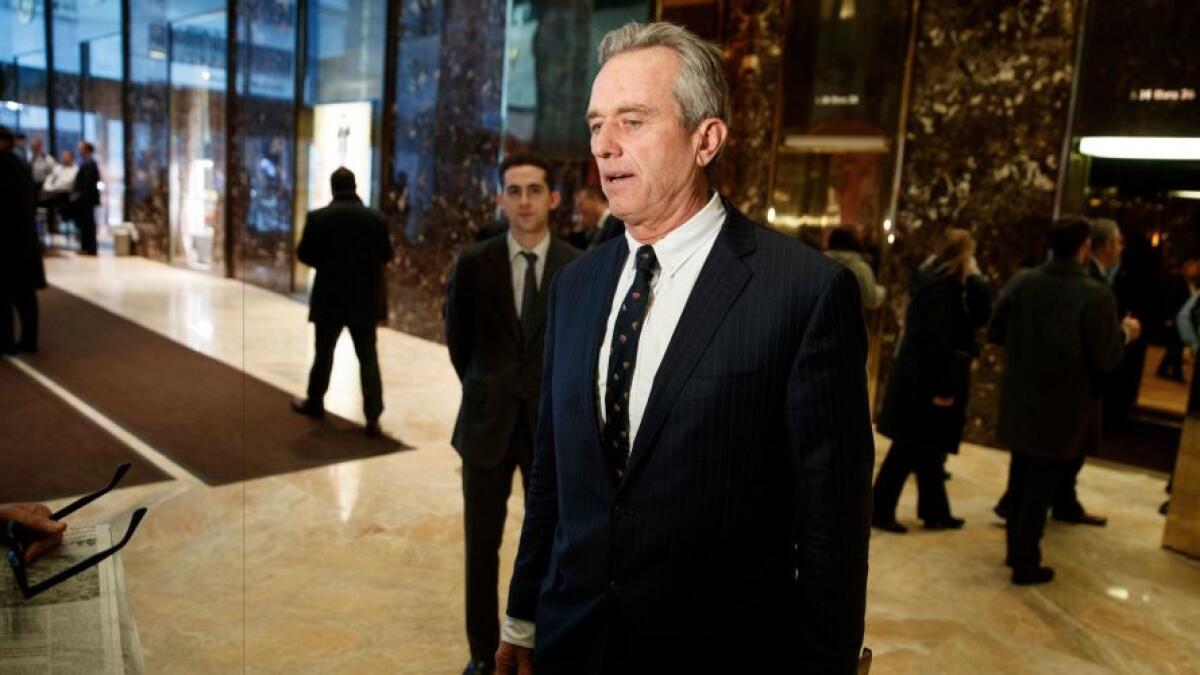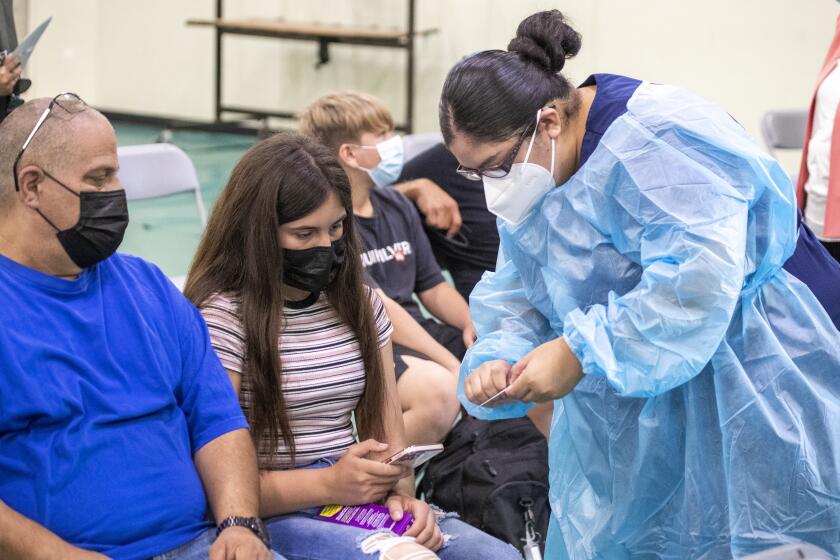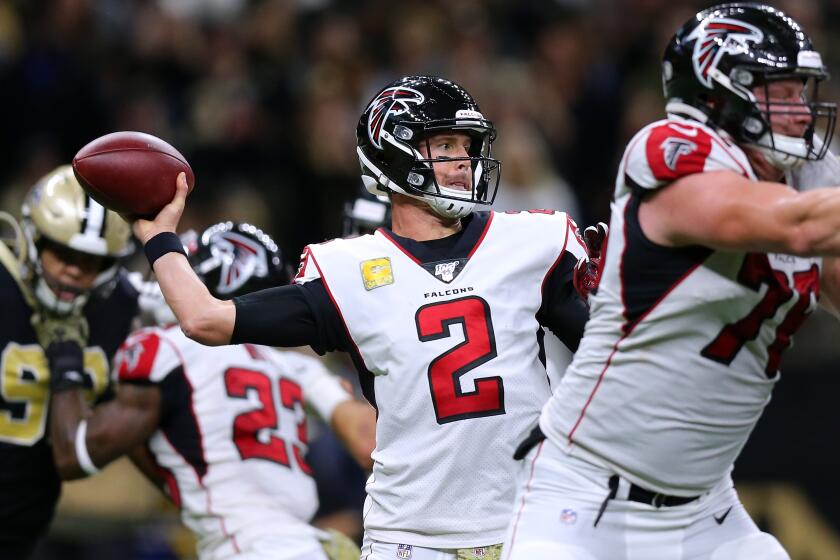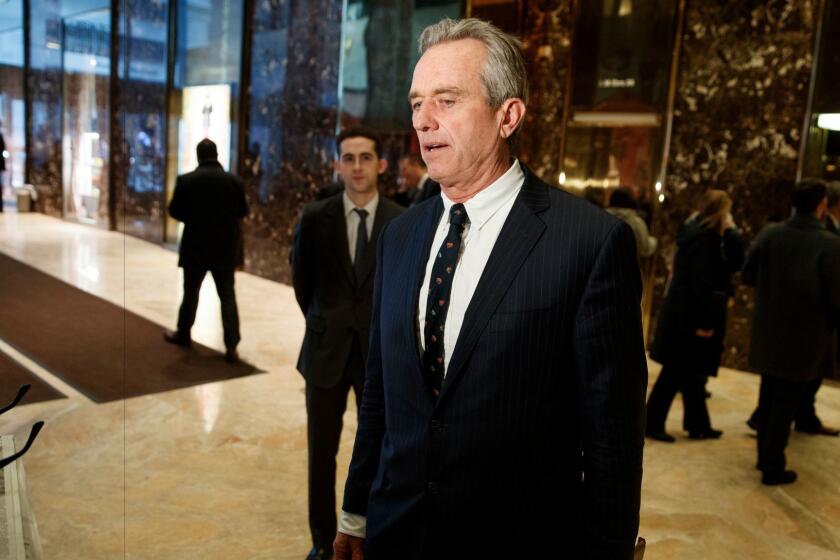Column: Following FDA approval of Pfizer’s shot, the anti-vaccine movement cooks up new conspiracy theory

If you expected the anti-vaccine crowd to stand down after the Food and Drug Administration gave final authorization to Pfizer’s COVID-19 shot, we have some bad news for you.
These people have come up with a new conspiracy claim about the shot. It’s no more credible than their old conspiracy theories, but lying hasn’t stopped them before, so why would it stop them now?
The new theory is complicated. It relies on the technicalities of government vaccine approval rules — specifically on a tortured interpretation of those rules. That’s not surprising: Conspiracy theorists often aim to ply the inexpert masses with plausible-sounding but inaccurate legalisms in order to sow confusion.
The conspiracy theory is a very tortured reading.
— William Schaffner, Vanderbilt University
Reduced to its essentials, the new claim is that the FDA didn’t really grant full authorization to the Pfizer vaccine, which has been christened Comirnaty.
They assert that the agency approved a Pfizer vaccine that isn’t actually available to Americans, while still allowing Pfizer to distribute a different COVID-19 vaccine under its previous emergency use authorization, or EUA.
The goal, they maintain, was to preserve Pfizer’s full protection from legal liability for injuries and deaths caused by the vaccine, which it holds under the EUA, rather than subject it to the partial liability granted manufacturers of fully approved vaccines.
Get the latest from Michael Hiltzik
Commentary on economics and more from a Pulitzer Prize winner.
You may occasionally receive promotional content from the Los Angeles Times.
Here’s Robert F. Kennedy Jr., a leading anti-vaccine figure, fomenting the new conspiracy theory: “Just as with Ford’s exploding Pinto, or Monsanto’s herbicide Roundup, people injured by the Comirnaty vaccine could potentially sue for damages.” In a screed on his anti-vaccination organization’s website, he adds that “jury awards could be astronomical.”
Building off that idea, the conspiracists assert that the FDA didn’t actually approve the vaccine. Here’s anti-vaxxer Greg Hunter on his website: “The big news the FDA had given ‘full approval’ to the Pfizer CV19 vaccine is a HUGE lie.”
Hunter’s claim is that the vaccine that the FDA approved and the one in common use today are different and that the FDA and Pfizer are involved in a shell game or a bait-and-switch. “Is this a huge lie to trick the public into taking the experimental shot?” Hunter asks. “I say yes.”
The FDA and Pfizer both say that’s incorrect. There’s one vaccine, and one only. “The licensed vaccine has the same formulation as the EUA-authorized vaccine,” the FDA states, “and the products can be used interchangeably.”
Pfizer told me by email that the FDA-approved vaccine is identical to the one that has been administered to millions of people around the world.
Ivermectin is increasingly the subject of misinformation and ignorance. It’s a troubling sign.
Legal experts say the conspiracy-mongers’ interpretations of the process and of its legal consequences are flatly wrong. Let’s unpack the theory and show where it’s gone off the rails.
The FDA granted the Pfizer shot its EUA on Dec. 11, launching the vaccine phase of the battle against the pandemic in the U.S. Of the other two vaccines in use in the U.S., the Moderna vaccine got its EUA on Dec. 18, and the Johnson & Johnson shot on Feb. 27.
The FDA gave full authorization to the Pfizer shot Aug. 23. Many experts hoped that this would open the door to vaccination mandates by private employers who had been waiting for the full-scale green light. That may be happening.
But it was also thought, optimistically, that full authorization would shut up the anti-vaccination movement, which had exploited the distinction between EUAs and full authorization to imply that the safety and efficacy of the vaccines were questionable.
I was doubtful. Although vaccine deniers were happy to base their pitch on the distinction, it wasn’t really at the core of their case against COVID-19 vaccination. They have plenty of other rationales for refusing vaccines, none of which holds water scientifically. I figured that they would simply find a way to question the authorization process, and that’s exactly what has happened.
Fox News, which had become a hive of anti-vaccine propaganda based in part on the FDA’s delay in granting the vaccines full authorization, aired out an alternative claim after the FDA approval.
That very day, Fox News, through its anchor Dana Perino, a former spokeswoman for ex-President George W. Bush, swiveled from questioning why approval was taking so long to declaring that “critics [are] asking if the process was rushed.” The question was promptly debunked on the air, so perhaps Fox will drop it.
But the anti-vax conspiracy theory has been infecting other corners of the right-wing fever swamp, such as Stephen K. Bannon’s “War Room” podcast and the Twitter account of right-wing lawyer Robert Barnes.
Faced with vaccine hesitancy among players, the NFL put its foot down.
These are claims that “many of the most prominent vaccine skeptics you might have heard of are pushing with increasing gusto,” writes Aaron Blake of the Washington Post. He’s distressingly correct.
The emerging anti-vaxxer theme relies on language in the FDA’s formal notice to Pfizer of its grant of full authorization. The notice specified that the EUA for the vaccine would be renewed and continued.
The FDA notice states: “Although COMIRNATY...is approved to prevent COVID-19 in individuals 16 years of age and older, there is not sufficient approved vaccine available for distribution to this population in its entirety....Additionally, there are no products that are approved to prevent COVID-19 in individuals age 12 through 15” or to provide the additional dose authorized under an EUA for immunocompromised patients.
So people as young as 12 can continue to receive the Pfizer vaccine under an EUA, while full authorization applies only to those 16 and older.
This legal distinction is largely procedural, and also applies to booster shots: They’ve been endorsed by the Biden administration and the Department of Health and Human Services, but will still require specific FDA approval, which is expected to be coming soon.
To be clear, if the FDA didn’t continue the EUA for the Pfizer shot as well as the full approval, everyone 12-15 years old would instantly have lost their right to the shot.
“I’m not suggesting that the bureaucratic language is a model of clarity,” William Schaffner, a public health expert at Vanderbilt University, “but the conspiracy theory is a very tortured reading.”
The anti-vaxxers assert in effect that the EUA and full authorization are mutually exclusive, as though a drug or vaccine can be only one or the other. That’s incorrect.
The continuation of the EUA “gives the FDA tremendous flexibility to say that even though there’s an approved product, there are reasons we still need this EUA,” says Patricia Zettler, a former counsel to the FDA now teaching law at Ohio State.
Scientific ignorance never lies very deep beneath the claims of the anti-vaccine movement.
As for whether the FDA and Pfizer are engaged in a bait-and-switch to preserve Pfizer’s immunity from lawsuits over the vaccine, “the continued existence of the EUA alongside the full approval has nothing to do with liability,” Zettler told me.
Its liability exemption derives from the so-called Public Readiness and Emergency Preparedness Act of 2005, known as the PREP Act, which gives legal protection to products crucial in emergencies for as long as the emergencies continue. Pfizer’s interpretation, for its part, is that the vaccine in all its forms is entitled to all PREP Act liability protections as designated medical countermeasures against COVID-19.
Another anti-vax argument is that the EUA-approved vaccine is “experimental.” Therefore, they argue, forcing people to take it violates the “Nuremberg Code.”
Lots of baloney packed in there. For one thing, the “Nuremberg Code,” which was devised in 1947 during the Nuremberg trials of Nazi war criminals, applies to experimentation on human subjects and essentially requires the subjects’ informed consent. In any event, it has been supplanted by more thorough standards for medical research.
But as oncologist and pseudoscience debunker David Gorski observes, writing under his nom de plume Orac, “the Code is not about medical treatment, only medical experimentation involving human subjects.”
Though anti-vaxxers assert that the COVID-19 vaccines are “experimental” because they’re under a EUA, that’s a legal, not a scientific or medical, designation. “From a scientific and medical standpoint, they are now legitimate medical preventative treatments,” Gorski notes, their safety and efficacy having been proved through more than 100 million shots.
The anti-vaccine arguments may seem complicated, but the anti-vaccination movement feeds on complexity. Its leaders have no scientific grounds to question the safety or efficacy of the COVID-19 vaccines, so they retreat to pure obfuscation. They are a public menace, aiming to obscure what Vanderbilt’s Schaffner says is the essence of public health policy.
“My old equation is ‘disease bad, vaccines good,’” he says. “So please get vaccinated.”
More to Read
Get the latest from Michael Hiltzik
Commentary on economics and more from a Pulitzer Prize winner.
You may occasionally receive promotional content from the Los Angeles Times.











